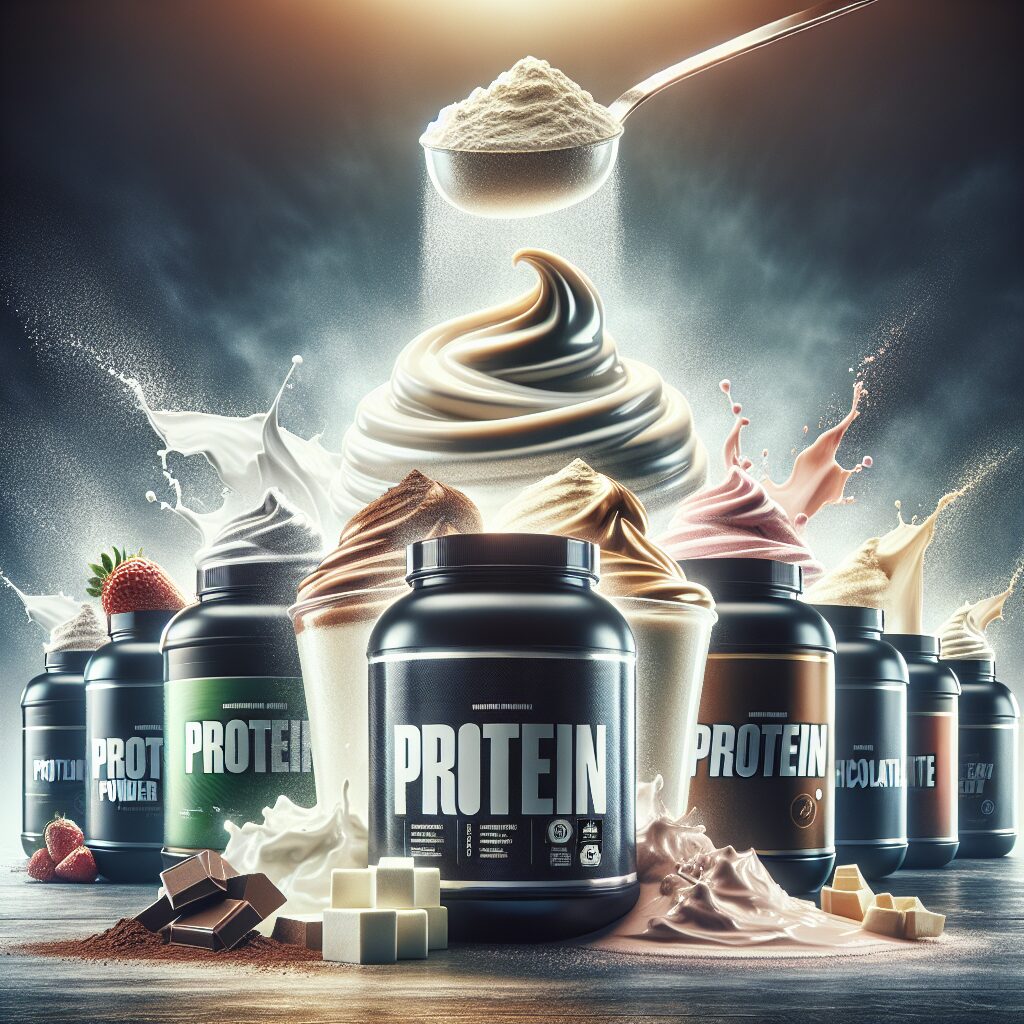In the fast-paced world of fitness and health, finding quality protein powder at a discounted price can often be a game-changer. When it comes to reaching your nutritional goals, investing in the right protein powder can make all the difference. That’s why we are excited to present to you a comprehensive article that will not only guide you through the different types of protein powders available in the market but also highlight an ongoing protein powder sale that is sure to cater to your needs. So, brace yourself for an informative journey as we unveil the secret to maximizing your workout gains with incredible protein powders at unbeatable prices.
Benefits of Protein Powder
Protein powder has become increasingly popular among individuals looking to improve their overall health and fitness. One of the key benefits of protein powder is its ability to increase muscle mass. When you engage in regular exercise, your muscles are constantly being broken down and rebuilt. Protein powder provides your muscles with the necessary amino acids to support the growth and repair process, ultimately leading to an increase in muscle mass.
Another benefit of protein powder is its ability to aid in recovery. After a strenuous workout, your muscles need time to repair and adapt to the stress they were subjected to. Consuming protein powder post-workout can help speed up the recovery process by providing your muscles with the necessary nutrients they need to repair and rebuild.
The convenience and ease of use of protein powder is also worth mentioning. Unlike whole food sources of protein, protein powder is quick and easy to prepare. Simply mix the desired amount of powder with water or your preferred liquid, and you have a convenient and portable source of protein. This makes protein powder a great option for those with busy lifestyles or individuals who are always on the go.
Types of Protein Powder
There are several different types of protein powder available on the market. One of the most popular types is whey protein. Whey protein is derived from milk and is highly regarded for its fast-acting nature. It is quickly absorbed by the body, making it an ideal choice for post-workout recovery.
Another type of protein powder is casein protein. Unlike whey protein, casein protein is slow-digesting, which means it provides a steady release of amino acids over a longer period of time. This makes it a great option for those looking for sustained muscle support, such as before bed.
Pea protein is a plant-based protein powder that is derived from yellow peas. It is a great option for vegetarians or individuals with dairy allergies. Pea protein is easily digestible and rich in essential amino acids.
Soy protein is another popular plant-based protein powder option. It is derived from the soybean plant and is a complete protein source, meaning it contains all nine essential amino acids. Soy protein is also rich in antioxidants and has been studied for its potential health benefits.

Factors to Consider Before Buying
Before purchasing protein powder, there are several factors to consider. The protein content is one of the most important factors to look for. Different brands and types of protein powders vary in their protein content per serving. It is important to choose a protein powder that aligns with your specific protein needs and goals.
The ingredients in protein powder can vary greatly. Some protein powders may contain added sugar or artificial additives, which may not be ideal for everyone. It is important to read the ingredient list and choose a protein powder that aligns with your dietary preferences and restrictions.
For individuals with allergies, it is crucial to check for allergens in protein powders. Many protein powders contain ingredients such as milk, soy, or nuts, which can trigger allergic reactions in some individuals. Always read the labels carefully and choose a protein powder that is free from allergens that may affect you.
Taste is another important factor to consider when choosing a protein powder. Some protein powders may have a chalky or artificial taste, which can make it difficult to consume regularly. It is advisable to read customer reviews or purchase sample packets to assess the taste before committing to a larger container.
Price is also a factor to consider when purchasing protein powder. Protein powders can vary greatly in price, depending on the brand, quality, and quantity. It is important to consider your budget and find a protein powder that offers the best value for your money.
Best Times to Use Protein Powder
Protein powder can be consumed at various times throughout the day to enhance your nutrition and support your fitness goals. One of the best times to use protein powder is immediately after a workout. During exercise, your muscles undergo stress and microtears, and consuming protein post-workout provides the necessary building blocks for muscle repair and growth.
Consuming protein powder before bed can also be beneficial. As you sleep, your body goes into a fasting state. Having a slow-digesting protein, such as casein, before bed helps provide a steady release of amino acids throughout the night, promoting muscle recovery and minimizing muscle breakdown.
Protein powder can also be used as a meal replacement. If you are short on time or on the go, a protein shake can provide a convenient and nutritious option to meet your protein needs. However, it is important to ensure that your meal replacement protein powder is balanced with other nutrients to provide a complete and well-rounded meal.

Different Flavors Available
Protein powder comes in a wide range of flavors, catering to different tastes and preferences. Some of the most popular flavors include chocolate, vanilla, strawberry, and cookies and cream. These flavors add a touch of sweetness to the protein powder, making it more enjoyable to consume.
When choosing a flavor, it is important to consider your personal taste preferences. Some individuals may prefer a rich and indulgent flavor like chocolate, while others may prefer a lighter and refreshing flavor like strawberry. Trying out different flavors or opting for sample packets can help you determine which flavors you enjoy the most.
How to Choose the Right Protein Powder
Choosing the right protein powder can be a daunting task, given the multitude of options available. To make the selection process easier, there are a few key factors to consider.
Firstly, determine your goals and objectives. Are you looking to build muscle mass, lose weight, or simply incorporate more protein into your diet? Different protein powders may cater to specific goals, so it is important to choose one that aligns with your individual needs.
Consider any dietary restrictions or preferences you may have. If you are lactose intolerant or follow a vegan lifestyle, options like whey protein may not be suitable. Look for protein powders that are specifically formulated to meet your dietary requirements.
Reading customer reviews can also provide valuable insights into the quality and effectiveness of different protein powders. Take the time to research and consider the experiences and feedback of other individuals who have tried the product.
Lastly, consulting with a healthcare professional or a registered dietitian can help ensure that you choose the right protein powder for your specific needs and goals. They can provide personalized recommendations based on your individual circumstances and help you make an informed decision.

Where to Find Protein Powder Sales
There are several places where you can find protein powder sales. Online retailers often have a wide selection of protein powders at competitive prices. They offer the convenience of shopping from the comfort of your own home and often provide detailed product descriptions and customer reviews to help you make an informed decision.
Health food stores are another great option for purchasing protein powder. They typically carry a variety of brands and flavors and often have knowledgeable staff who can provide guidance and recommendations based on your specific needs.
Local gyms may also sell protein powder as part of their supplement offerings. This can be convenient if you prefer to purchase your protein powder in person and want to support local businesses.
Coupon websites can also be a valuable resource for finding protein powder sales. They often compile discounts and promotions from various retailers, allowing you to save money on your protein powder purchase.
Tips for Saving Money on Protein Powder
Protein powder can be a significant investment, especially if you consume it regularly. However, there are several tips and strategies you can employ to save money on your protein powder purchases.
Buying in bulk is a great way to save money in the long run. Many retailers offer discounts when you purchase larger quantities of protein powder. By buying in bulk, you can save money and ensure that you always have an adequate supply of protein powder on hand.
Signing up for newsletters from your favorite protein powder brands or retailers can be a good way to stay updated on sales and promotions. Companies often offer exclusive discounts and deals to their loyal subscribers.
Comparing prices across different retailers is also important. Prices for protein powder can vary, so it is worth checking multiple sources to find the best deal. Online price comparison tools can help streamline this process and save you time.
Finally, keep an eye out for promotions and discounts. Retailers often run seasonal or holiday sales, offering significant savings on protein powder. Utilizing these promotions can help you save money and make your protein powder more affordable.

Protein Powder vs. Whole Foods
Protein powder is often compared to whole foods as a source of dietary protein. While both options have their advantages and disadvantages, it is important to consider individual preferences and goals when choosing between the two.
One advantage of protein powder is its high nutrient density. Protein powders often provide a concentrated source of protein, with minimal amounts of fats and carbohydrates. This can be beneficial for individuals looking to increase their protein intake while keeping their calorie intake in check.
Protein powder also offers convenience that whole foods may not. Protein shakes can be prepared quickly and easily, making them a convenient option for individuals with busy lifestyles. Whole foods, on the other hand, may require more time and effort to prepare and consume.
Digestion is another factor to consider. Some individuals may find that protein powders are easier to digest compared to whole foods. This can be especially beneficial for those with sensitive stomachs or digestive issues.
On the other hand, whole foods offer the advantage of being natural and unprocessed. They provide a wide range of other nutrients, such as vitamins, minerals, and fiber, which may not be present in protein powders. Whole foods also offer variety and can be more enjoyable to consume for some individuals.
Ultimately, the choice between protein powder and whole foods depends on individual preferences, dietary needs, and goals. It is always important to strike a balance and incorporate a variety of protein sources in your diet for optimal nutrition.
Common Myths About Protein Powder
There are several common myths about protein powder that have been perpetuated over the years. It is important to debunk these myths and provide accurate information to ensure individuals make informed decisions.
One common myth is that protein powder is only for bodybuilders. While protein powder is popular among athletes and bodybuilders, it can be beneficial for individuals of all fitness levels. Protein is an essential nutrient that supports various bodily functions, and incorporating protein powder into your diet can help ensure that you meet your daily protein requirements.
Another myth is that protein powder leads to kidney damage. This misconception stems from the belief that a high protein intake can put strain on the kidneys. However, numerous studies have shown that protein powder consumption within the recommended daily limits does not pose any harm to kidney health in individuals with normal kidney function.
Lastly, some individuals believe that protein powder is a form of doping. This myth likely arises from the association of protein powder with athlete supplementation. However, protein powder is not classified as a performance-enhancing substance and is widely accepted as a safe and legal dietary supplement.
It is important to debunk these myths and provide accurate information to ensure that individuals can make informed decisions about incorporating protein powder into their daily routine. Protein powder, when consumed in moderation and as part of a balanced diet, can be a valuable tool for optimizing health and supporting fitness goals.





